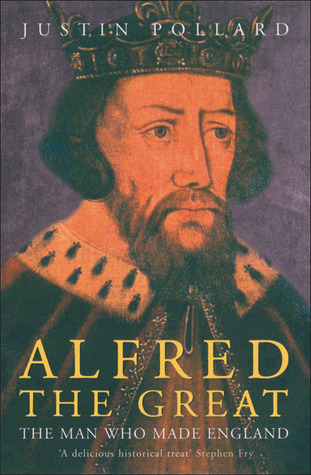
Rating: 5 Stars
Review:
Anglo-Saxon England might be the most intriguing period for me in the history of the country. I have often wondered how different the world might be had England remained in the hands of King Harold and the Norman invasion thwarted. The possibilities are interesting. This time period is also frustrating, as there is very little evidence left of these great people, particularly from Alfred's time and before. The scraps of information and rare objects we do have are precious; it saddens me to think that what is now left of the mortal remains of this great king, the man who united the warring kingdoms into what would become England and fought off the Vikings time and again, are scattered somewhere in the soil among the modern buildings of Winchester.
Now, onto the book itself...
Everyone knows the (highly likely untrue) story of England's King Alfred, deprived of his throne and set to wander his lands as a fugitive, taking refuge with a poor swineherd. Here he is either reading a book or lost in thought by the fire, only to be rebuked by the swineherd's wife for letting the cakes burn. Alfred accepts the scolding, unrecognized by his own subjects as their former, but true, king.
It's a highly romanticized story of Alfred's time away from his throne, but one the author touches on time and again when noting the importance of and connection to religion in this time period. Christians at this time still believed wholeheartedly in the daily miracles of God, in a time where men we now call saints were living, breathing people among them. I have not read extensively about Alfred yet, though I have read quite a bit about Anglo-Saxon England in general, so I am not yet sure if this is the author's own conclusion, or the conclusion reached by scholars before him, but he refers to this story as a kind of metaphor for England as a whole. Early in Alfred's reign, in the four years of relative peace before the Vikings again returned and betrayal within Alfred's own court enabled the witan to depose him, Alfred did not do all he might have in order to prepare for the repeated attacks that could only be held off with the Danegeld for so long. The conclusion is that this story is a metaphor for Alfred's reign in that time - he didn't pay attention like he should have so the cakes burned, much like he did not take care to fortify his fledgling kingdom, and so it too burned.
It is amazing to me how, though Alfred lived and died in what would be considered the end of the 'Dark Ages', a significant portion of his time and funds were directed toward learning and educating his people. He was a major supporter of translating great works for his people to read in their native tongue - English. He even sent an item (called an æstel) with these books when they were distributed to every bishopric - one of which was found in the late 1600s - which has today been concluded that its possible function was a pointer or a bookmark.

(Property of the Ashmolean Museum in Oxford)

(Property of the Ashmolean Museum in Oxford; the inscription on the side reads: 'Alfred Ordered/Had Me Made' - I have read different translations using either word)
King Alfred felt that literature and education was imperative to the survival of his kingdom. I of course don't mean education as we know it today: all the good little boys and girls in there desks with pencils sharpened, ready to absorb knowledge. I mean in the sense that he felt it was important for the men governing the burhs in his name to be learned men so that they would be able to read his laws, to dispense justice correctly and appropriately, and for all people to have access to the great books. And while it is again highly unlikely that he actually learned Latin in a single day, Alfred did set about educating himself as well and learned the already-dead language.
Whether you have read about Alfred before or this is your first foray into the arena, this is a fantastic read. It is written in such a way that it is accessible both to the lay reader looking for a 'popular history', as well as those who have background knowledge already and would be considered more academic. It chronicles the years and events leading up to Alfred's birth and sets the stage for this king to become, well, great. There's everything you would expect from the time period - Vikings raids, the warring kingdoms of Wessex, Mercia, East Anglia, etc., betrayal, tragedy, and triumph. I highly recommend this one.
No comments:
Post a Comment
Thanks for visiting my little book nook. I love talking books so leave a comment and let's chat!